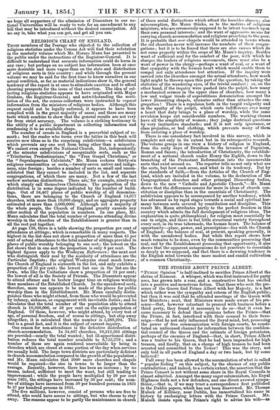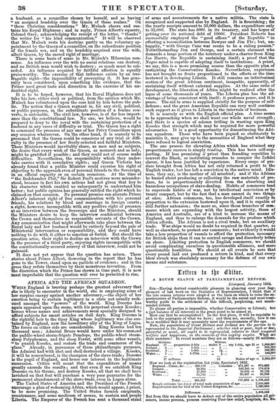THE STORIES ABOUT PRINCE ALBERT.
"PUBLIC Opinion " is half-inclined to sacrifice Prince Albert at the shrine of Rumour. A whisper, which was first insinuated for party uses, has grown into a roar, and a constructive hint has swelled into a positive and monstrous fiction. That those who seek the pre- sence of the Queen find Prince Albert with her Majesty, is a fact which rather won the sympathy and esteem of the English public; but then it was said that he attended meetings of the Queen with her Ministers ; next, that Ministers were made aware of his pre- sence—that, however reluctant to proceed with business before a third party, they found it necessary to do so—that it even be- came necessary to defend their opinions before the Prince—that the Prince, in fact, interfered with their counsel to their Sove- reign—that he not only influenced the Royal mind, but, possessing the power of free communication with foreign courts, he consti- tuted an unlicensed channel for information between the confiden- tial council of the Queen and the cabinets of foreign potentates, perhaps of the enemies of England—that, in short, Prince Albert was a traitor to his Queen, that he had been impeached for high treason, and finally, that on a charge of high treason he had been arrested and committed to the Tower! This was the story, not only told in all parts of England a day or two back, but by some believed !
Full sway has been allowed to the accumulation of what is called " popular feeling " on this subject, by the absence of any public contradiction ; and indeed, to a certain extent, the assertion that the Prince Consort is not without some share in the Royal Councils is almost admitted. Amongst the many eager calumniators, his Royal Highness finds not a few defenders, and one direct avowed sympa- thizer,—that is, if we may trust a correspondence first published in the Dublin papers, which has not been disavowed. Mr. Thomas Mulock of Killiney, near Dublin, has immortalized his name in history by exchanging letters with the Prince Consort. Mr. Mulock insists upon the Prince's right to advise his wife—as a husband, as a councillor chosen by herself, and as having " an assigned headship over the Queen of these realms." On "these Christian considerations" Mr. Mulock cheers and sus- tains his Royal Highness ; and in reply, Prince Albert's equerry, Colonel Grey, acknowledging the receipt of the letter, "thanks" the writer for " his kind communication." It will be observed that Mr. Mulock rests his doctrine partly on the voluntary ap- pointment by the Queen of a councillor, on the subordinate position of the female sex, and on the headship acquired over the -wife, albeit Queen, by the sacred right of marriage.
'There is some basis of sense in Mr. Mulock's Hibernian non- sense. An influence over the wife no social relations can destroy, and no British man would wish to destroy ; so much must be con- ceded. An influence acquired by faithful affection is equally praiseworthy. The exercise of that influence exists by an irre- fragable right—the impossibility of preventing it. It has gene- rally been considered, upon something like evidence, that the Prince used great taste and discretion in the exercise of his un- doubted right.
It is to be hoped, however, that his Royal Highness does not take his law, either civil or political, from the opinion which Mr. Mulock has volunteered upon the case laid by him before the pub- lie. The notion that a Queen regnant is, for any civil, political, or public purposes, in the subordinate position of a femme con- verte, is untenable. The civil law, however, is of far less import- ance than the constitutional law. No one, we believe, would be prepared to deny to the royal wife the sustaining protection of a husband in any cases of difficulty or trial. The Queen has a right to command the presence of any one of her Privy Councillors upon any occasion whatsoever. On the other hand, it is scarcely to be presumed that the Queen could be conscious of any trial or diffi- culty in the presence of her freely-selected and faithful Ministers. Those Ministers would inevitably share, as men and as subjects, the desire that every wish of the Queen, as monarch and as lady, might be gratified if possible ; and they could not of course make difficulties. Nevertheless, the responsibility which they under- take carries with it correlative rights ; and Queen Victoria has already found that a public Minister could exercise his right of objecting to the approach even of personal friends to the Sovereign, in an official capacity or on certain occasions. At the time of "the Bedchamber Plot," Sir Robert Peel's motives were misunder- stood, because in fact his own actions had not given that key to his character which enabled us subsequently to understand him better ; but public opinion has generally ratified the right which he claimed on that occasion. No personal promise can alienate Prince Albert's inherent right of free communication with his personal friends, his relations by blood and marriage in foreign courts ; a right, however, incompatible with any positive right of presence at an interview between the Sovereign and the Ministers, should the Ministers desire to keep the interview confidential between the Crown and themselves as -responsible servants of the Crown. .Any communication that might afterwards take place between the Royal lady and her husband would be entirely beyond the pale of ri Ministeal intervention or responsibility, and they could have nothing to do with it either to sanction or forbid. But should the question arise, their right to decline an interview with the Crown in the presence of a third party, enjoying rights incompatible with the constitutionally-secured secrecy of that interview, could not be gain said. It does not yet appear that the question has arisen. These stories about Prince Albert, flowering in the report that he has gone to the Tower, stand upon no particle of evidence ; and in the gross they refute themselves by their monstrous invention. From the discretion which the Prince has shown in time past, it is now most improbable that the question will ever be permitted to rise.



























 Previous page
Previous page